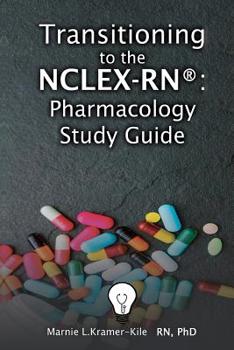NCLEX-RN (R) - Pharmacology Study Guide
The purpose of this pharmacology study guide is to help nursing graduates work through the vast amount of pharmacological knowledge required for the NCLEX-RN(R) in a systematic and purposeful way. The breadth and detail of the knowledge required of pharmacological concepts often overwhelms new graduates when they are beginning their exam preparation. This guide organizes content using the current NCLEX-RN(R) Test Plan (2016-2019) and provides specific strategies to address pharmacological areas of review which may challenge new graduates in their exam preparation. The guide was created by an experienced undergraduate nurse educator specializing in critical thinking development and application for high stakes exam writing. Many candidates, while studying for the NCLEX-RN(R), often forgo studying pharmacological concepts in the detail required for the exam. Unique to this Pharmacology Guide is a five step algorithm, created by the author, to help graduates approach drug-to-drug interaction questions. This algorithm is designed to help uncover correct answers by using pharmacological principles rather than memorizing drugs that interact with one another. The purpose of the modules in this Pharmacology study guide series are to: - Provide in-depth review of the major drug classes from a systems approach (e.g. respiratory, nervous system etc...) to help increase retention of key concepts and encourage application of pharmacological therapy in the context of disease management. - Summarize important information related to drug therapy and guide graduates to in-depth review of serious adverse events associated with medications. The modules will contain summary tables, review questions and exercises for key concepts. - Direct the reader to important areas for client assessment during drug therapy This is a working pharmacology study guide, so while key information will be presented and organized for review, it is up to you to do the detailed work of content review by answering the questions and exercises in each module The following resources are recommended to use with this pharmacology study guide: 1. Pharmacology textbook. This resource will contain the detailed information pertaining to drug classes and specific nursing considerations related to drug therapy. 2. Drug guide. These resources contain alphabetized drug information and outline pharmacokinetic and pharmacodynamics characteristics of medications. You will find important information related to the absorption, distribution, metabolism and excretions of drugs- as well as protein binding and therapeutic index. 3. An online drug repository if the resources above do not contain the information needed to answer the questions in the guide. Each module contains practice questions using NCLEX-RN(R) formatted questions. It is recommended that you seek additional practice questions from resources that challenge you to go into pharmacological concepts such as serious adverse events and drug-to-drug interactions in detail and test your knowledge specific nursing interventions related to drug therapy. There are a total of 12 working Modules covered in the Pharmacology Study Guide: Module 1: Understanding Drug-to-Drug Interactions Module 2: Drugs Affecting the Respiratory System Module 3: Drugs Affecting the Nervous System Module 4: Drugs Affecting the Gastrointestinal System Module 5: Vascular and Cardiac Medications Module 6: Drugs Affecting the Urinary and Renal System Module 7: Anti-Infective Medications Module 8: Drugs Affecting the Endocrine System Module 9: Antineoplastic Medications Module 10: Medications Given in Mental Health Contexts Module 11: Drugs and the Intra/Ante/Post-Partum Client Module 12: Pain Management and Anesthesia
Format:Paperback
Language:English
ISBN:1530963133
ISBN13:9781530963133
Release Date:April 2016
Publisher:Createspace Independent Publishing Platform
Length:318 Pages
Weight:1.20 lbs.
Dimensions:0.7" x 6.1" x 9.2"
Customer Reviews
0 rating





